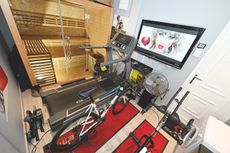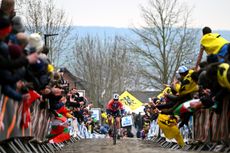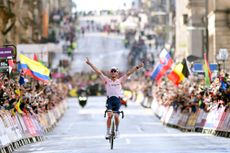Cervélo S5 SRAM Force review - Cycling Weekly’s Race Bike of the Year
A drill-down into the winner of our Race Bike of the Year awards 2023

The particular blend of handling comfort and aerodynamics in the Cervélo S5 is simply superb. There are lighter aero bikes - the Trek Madone and Scott Foil count amongst them. There are also more comfortable bikes, Cervélo's own R5 climbing being one of the shining beacons in the World Tour, along with the Specialized Roubaix. But each of those gives more ground in other areas than the S5 concedes. It is a deserved winner of our Race Bike of the Year award.
-
+
Super fast
-
+
Great handling
-
+
Very comfortable
-
+
More user-friendly handlebars
-
-
There are lighter aero bikes
You can trust Cycling Weekly.
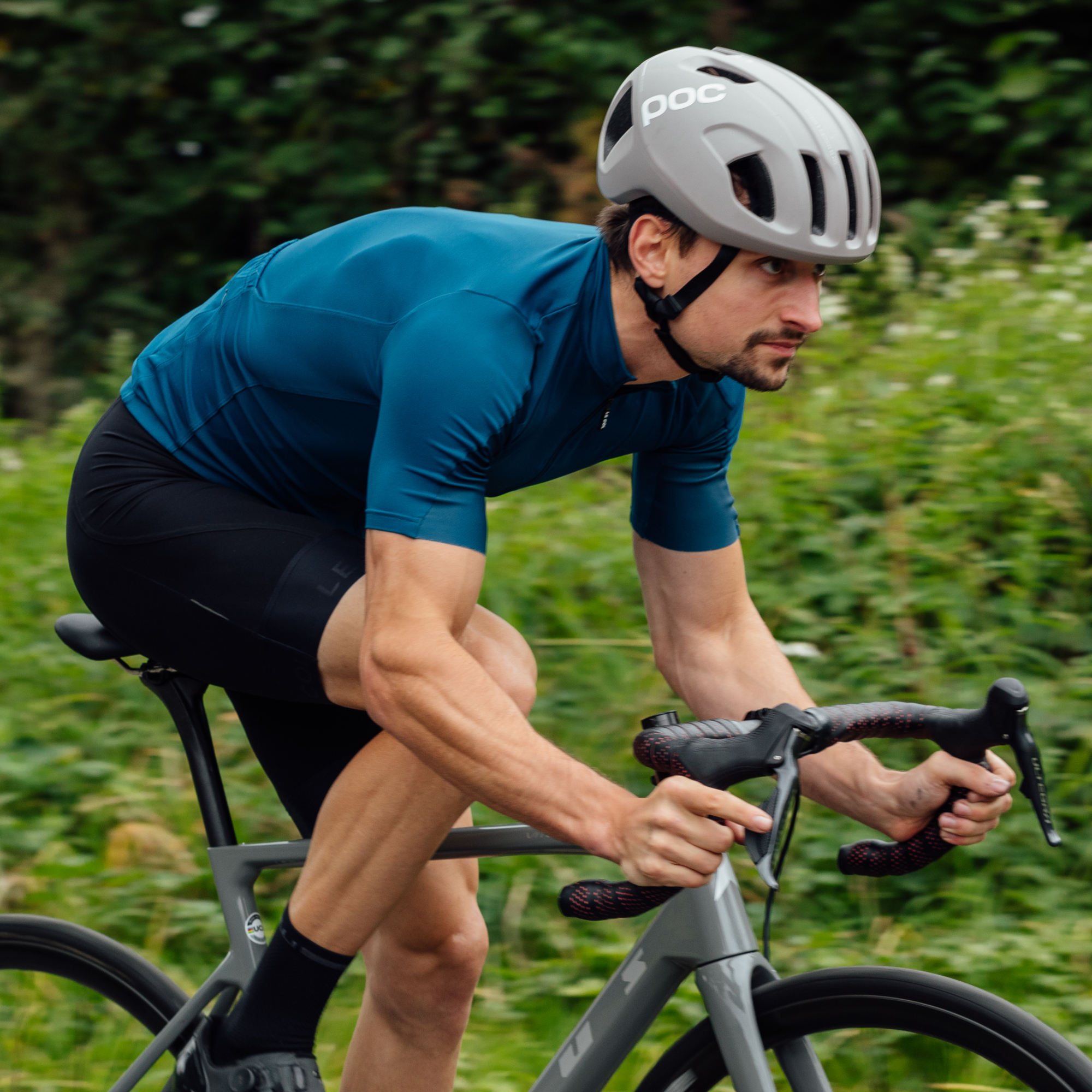
The latest iteration of the Cervélo S5 aero bike was officially released last summer, cinching both the Yellow and Green Jerseys of the 2022 Tour de France - under the stewardship of Jonas Vingegaard and Wout van Aert, respectively.
But the launch was a long time coming, having broken cover many many times earlier in the season - and even in the season previous. The Cervélo S5 was piloted to victory in both the Women’s and the Men’s races of the 2021 Ghent–Wevelgem Classic by Marianne Vos and Wout van Aert.
Another podium the Cervélo S5 has managed to roll atop of is Cycling Weekly’s 2023 Race Bike of the Year awards, fending off the fierce competition. And sure enough, if it was a pure battle of the spec sheets, the S5 wouldn’t have measured up quite so well - its frame comes in heavier than some of its closest competitors for a start.
But it’s how all the design elements and components perform together which determines how a bike feels to ride - and you only get a sense of that by putting in the miles. Right here, I’ll be going in greater depth on the Cervélo S5 itself - if you’d like a more comparative take on how it stacks up against the new Trek Madone, the Scott Foil, check out our full Race Bike of the Year 2023 write up over here.
Cervélo S5: construction

Let’s start first with the groupset and then get onto what really sets the Cervélo S5 apart afterwards.
This model came specced with SRAM’s second tier 2x12 speed Force AXS groupset. As such, it was has fully wireless shifting, with batteries on each mech and no electronic cables to worry about.
The gearing is fairly standard with a 48/35t chainring and 10-33t cassette - delivering a wide range and plenty of single tooth jumps for a smooth progression between those gears which you’ll be using most often

The disc rotors are 160mm front and rear, which we like to see for ease of spares and minimising the chances of over-heating. Finally, it comes with SRAM's power meter crankset to complete the package straight out of the box.
Coming now to the finishing kit, as with every modern aero bike, the seatpost is a propriety model with a deep cross-section and kammtail shape. It is available in two different off-sets, though, (0mm and 25mm) to suit your bike fit preferences.
Moving to the front of the bike, Cervélo has revamped its handlebar to make it a little more user-friendly. Despite first appearances, it is actually a two piece unit and swapping between bar widths doesn't require you to disconnect the brake hoses. The split spacers also allow you to make adjustments to the stack height while keeping the brake lines all in place, too.

The component choices which I'd argue make the biggest difference to the ride quality and performance are the Reserve 52|63 wheels, which are (unsurprisingly) 52mm deep at the front and 63mm deep at the rear.
Similar to other brands, such as Hunt, which are pushing the envelope of wheelset aero dynamics, the profile of these Reserve rims is front and rear specific - and on the front bows out to a whopping 35mm.
The internal rim width is similarly wide, coming in at 24.4mm. That puts it behind the 25mm internal width of Zipp's 353 NSW wheels - but still much wider than most road wheelsets on the market. Paired with a set of nominally 28mm Vittoria Corsa tires, the rubber plumps out to a measured width of over 31mm - visually fatter than most other aero bikes.

Finally, onto the geometry. In terms of the how aggressive the front end is, it can help to look at the stack to reach ratio rather than comparing the numbers directly. This is because there is generally always some divergence between each bike brand's sizing. If one bike has a stack height which is a little higher - but the reach is also proportionally longer - it's not a more relaxed frameset, it's just a little bigger.
When comparing stack to reach ratios, a lower number is more aggressive - with the stack height lower for the same amount of reach. In a size medium, the Cervélo S5 has a ratio of 1.41:1, which is equal with the Scott Foil and actually more aggressive than the Trek Madone (1.44:1), although it is a little more upright than the Giant Propel (1.4:1) and Canyon CF SLX 8 (1.38:1).
The Cervélo S5 also has one of the shorter wheelbases out of the World Tour bikes we've tested and as well as coming in with the joint-shortest chain stays (at 405mm) and one of the steepest head tube angles. These are generally markers of a bike which has lightening-fast handling and needs similarly deft control to match. But, as I'll get onto next, although the S5 did prove itself in the corners, there wasn't that feeling of being on a razor-edge. It actually felt distinctly controlled - which in turn made it easier to take nearer its limits, as I was more confident I wouldn't end up unintentionally exceeding them.
Cervélo S5: the ride
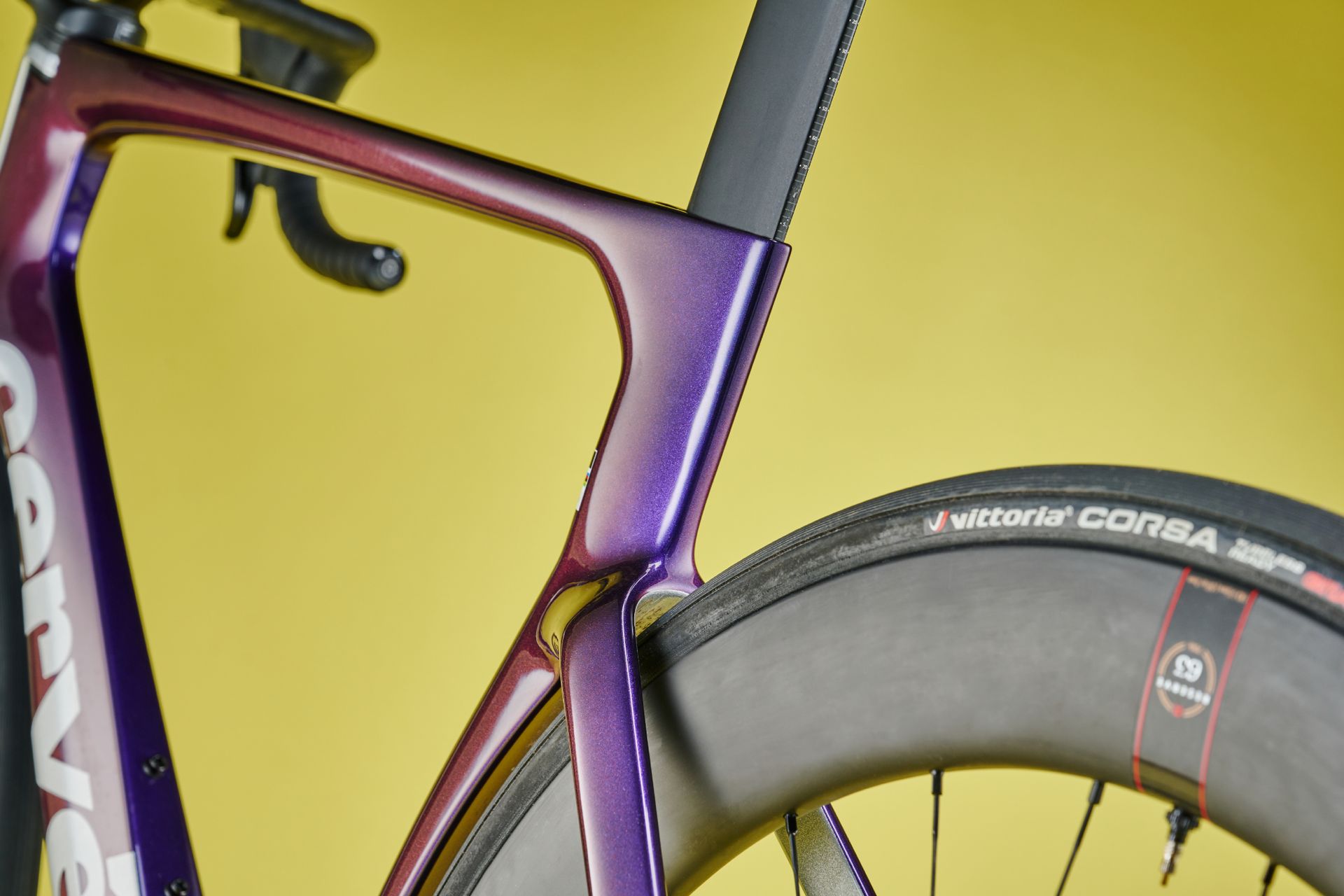
Now onto the ride and there are two areas where the Cervélo S5 shines particularly. Let's start with the aerodynamics. Although the S5 may not be the most windcheating model on test, the ride still feels very fast. The updated tubes from the previous iteration likely play a part in this (the new S5 is claimed to be seven watts faster) - but also the comfy shaping of the bars makes it easy to hold the ‘aero-hoods’ position for long durations, albeit with a 42cm centre-to-centre width, rather than the 39cm of the Madone.

Still, it’s the handling which really sets the Cervélo S5 apart. It’s quick to respond to a change of line but manages to remain far from being twitchy. The result is that it’s just so easy to really rail the corners and it was all the faster for it. That wheel/tyre combo of the Vittoria Corsa tyres and Reserve wheelset does play a sizable roll in this, offering up oodles of grip and keeping a smooth connection with the tarmac.
To some extent, the evaluation of a bike shouldn't hang too much on its wheels - it's a pretty easy component to swap out after all. But on the other hand, it is a relevant consideration when reviewing a complete bike - and particularly when comparing the flagship models of the biggest bike brands, especially when so many are producing their own wheels in house now.
So credit where it's due, the combination of the Reserve 52|63 and Vittoria Corsa tyres is a particularly good match and surpasses the stock specs of the other World Tour bikes tested as part of Road Bike of the Year. Not only does the large contact patch increase the amount of grip on offer, it also makes the shoulders of the tyres much more gently sloping, giving a more progressive feeling when banking it over.
It also means that the ride quality of the S5 is actually better than all others on test – even those models with fancy flexing seat posts. Speed over coarser sections of tarmac is likewise palpably faster, as the bumps are just absorbed rather than pinging the bike about.

There’s no getting away from the weight of the S5. At 8.22kg for this SRAM Force build, the S5 is heavier than comparable models. The Scott Foil (albeit with SRAM Red) came in at 7.28kg. Despite this, the S5 manages not to feel sluggish - likely because the gains in aerodynamics, rolling resistance and frame stiffness outweigh its mass on even moderately steep gradients.
Value
The Cervélo S5 is a very expensive bike, at $9,000 / £9,600, it's as expensive as Canyon's range-topping Aeroad CFR eTap in the US and slightly cheaper in the UK ($8,999 / £9,999). On the other hand, the Trek Madone is over a grand more expensive for a similar spec.
In our Race Bike of the Year grouptest, we ran a category for the Best Value race bike - and it was the new Giant Propel which cinched that category. When it came to determining the overall winner, price wasn't a consideration: the focus was solely performance.
Verdict
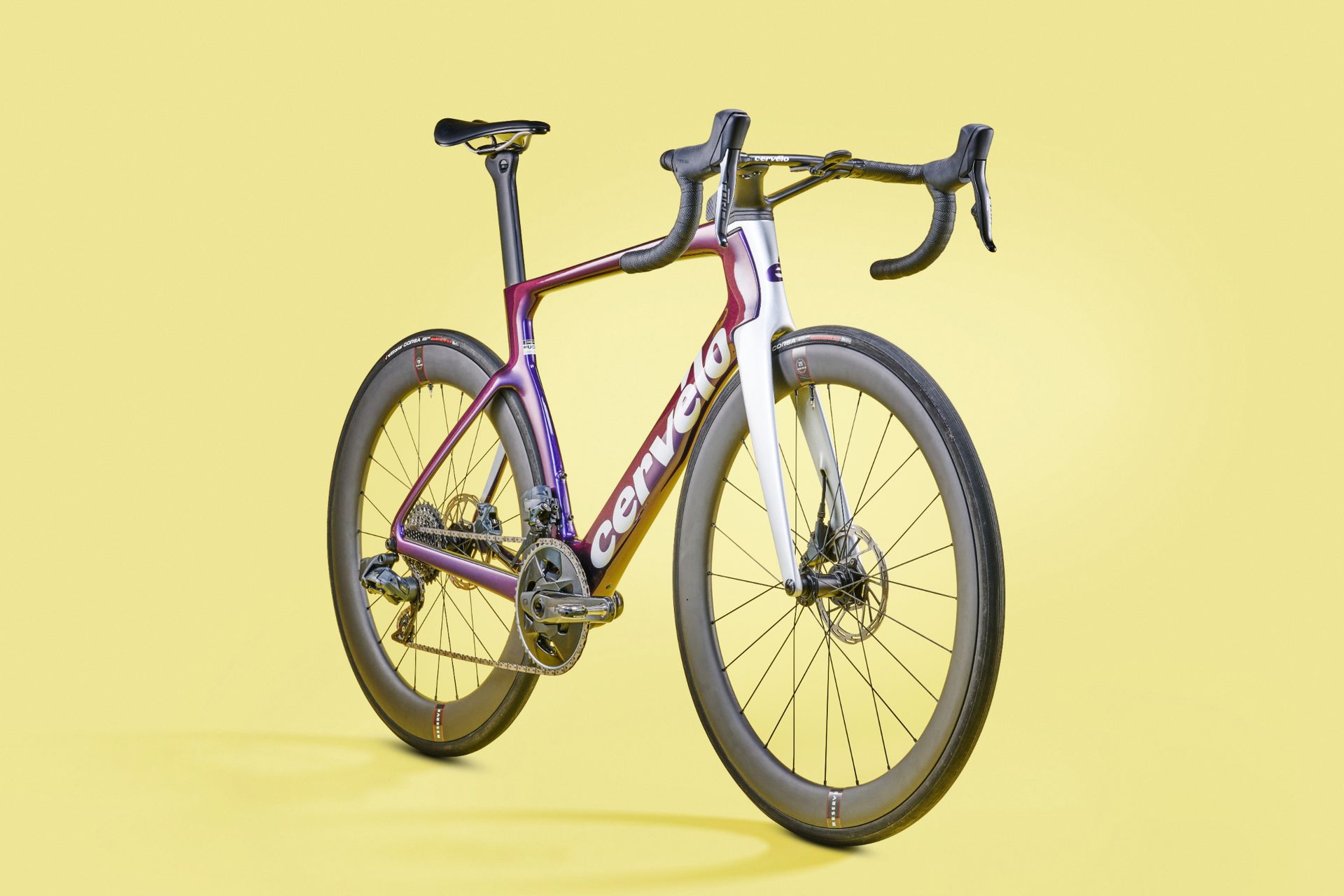
The particular blend of handling comfort and aerodynamics in the Cervélo S5 is simply superb. There are lighter aero bikes - the Trek Madone and Scott Foil count amongst them. There are also more comfortable bikes, Cervélo's R5 climbing being one of the shining beacons in the World Tour, along with the Specialized Roubaix. But each of those gives more ground in other areas than the S5 concedes. It is a deserved winner of our Race Bike of the Year award.

Thank you for reading 20 articles this month* Join now for unlimited access
Enjoy your first month for just £1 / $1 / €1
*Read 5 free articles per month without a subscription

Join now for unlimited access
Try first month for just £1 / $1 / €1
Get The Leadout Newsletter
The latest race content, interviews, features, reviews and expert buying guides, direct to your inbox!

After winning the 2019 National Single-Speed Cross-Country Mountain Biking Championships and claiming the plushie unicorn (true story), Stefan swapped the flat-bars for drop-bars and has never looked back.
Since then, he’s earnt his 2ⁿᵈ cat racing licence in his first season racing as a third, completed the South Downs Double in under 20 hours and Everested in under 12.
But his favourite rides are multiday bikepacking trips, with all the huge amount of cycling tech and long days spent exploring new roads and trails - as well as histories and cultures. Most recently, he’s spent two weeks riding from Budapest into the mountains of Slovakia.
Height: 177cm
Weight: 67–69kg
-
 My Training Space: 'I jump off my bike into the sauna – heat is no longer a limiting factor for me!'
My Training Space: 'I jump off my bike into the sauna – heat is no longer a limiting factor for me!'TT veteran, Ironman and CW reader Keith Murray gives us a tour of his Taylor Swift-resounding garage
By David Bradford Published
-
 Tour of Flanders, Giro d'Italia, Paris-Roubaix Femmes: Cycling Weekly's races of the year for 2023
Tour of Flanders, Giro d'Italia, Paris-Roubaix Femmes: Cycling Weekly's races of the year for 2023Our writers pick their best moments from an enthralling 2023, what do you think?
By Adam Becket Published
-
 Mathieu van der Poel voted 'Rider of the Year' by 35% of readers: here's why
Mathieu van der Poel voted 'Rider of the Year' by 35% of readers: here's whyThe Dutch showman lit up the men’s race scene with an unprecedented double
By Chris Marshall-Bell Published
